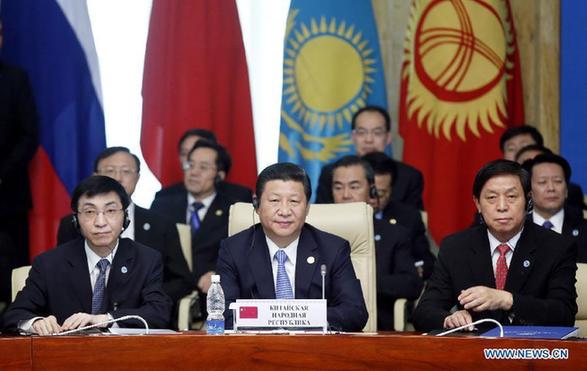China's goodwill diplomacy sets course for the future
- By Shen Dingli
 0 Comment(s)
0 Comment(s) Print
Print E-mail China.org.cn, January 5, 2014
E-mail China.org.cn, January 5, 2014
China has always sought good diplomatic relations with major powers, neighboring countries and developing countries, but is now taking more diplomatic initiatives and pursuing its own style of balancing. This is exemplified by President Xi Jinping's push to define a new, carefully planned architecture for China's major-country relationships - an initiative that was once again highlighted at the important Peripheral Diplomacy Work Conference convened in late October.
|
|
|
Chinese President Xi Jinping (C, front) attends the 13th Shanghai Cooperation Organization (SCO) summit in Bishkek, Kyrgyzstan, Sept. 13, 2013. [Xinhua/Ju Peng] |
A key element of foreign policy under the new administration has been Beijing's new willingness to conceive and present its own initiatives for stabilizing the region and the world, while continuing to focus on common development and security.
During 2013, President Xi made four trips abroad, paying formal and informal visits to major powers, peripheral states, and a number of developing countries, especially to members of crucial regional development and security organizations such as the Shanghai Cooperation Organization (SCO) and Asia-Pacific Economic Cooperation (APEC).
Shortly after assuming power, President Xi made his international debut in March 2013 as China's new leader, with a visit to Russia high on his agenda. By strengthening Beijing's strategic partnership with Moscow, China sent an unambiguous message to the world that it is dedicated to global stability, and that China and Russia, as key independent players in the world, have crucial responsibilities in this regard. On his second international tour, President Xi included the U.S. in his itinerary, and had a substantial exchange of views with his American counterpart, President Barack Obama, at a lengthy unofficial summit at Annenberg, California.
The idea that China and the U.S. should forge a "new type of major-country relationship," first proposed by President Xi two years ago and discussed with President Obama at Annenberg, sets a new benchmark for relations between the two countries. The term "new type" expresses a mutual assurance that China and the U.S. will collaborate to pursue each other's common benefit rather than engaging in counterproductive competition or rivalry.
But turning slogans into practice requires time and action. Facing nuclear tests and threats emanating from the Korean Peninsula, China and the United States stood together to meet the challenge. President Xi spoke firmly at the Bo'ao Asia Forum, indicating that China would not allow any country to throw the region and the entire world into chaos in pursuit of its own selfish ends. Despite differences on the approach to resolving the Iran nuclear issue and the question of Syria's chemical weapons, Beijing and Washington, together with Russia and others, have been able to find mutually acceptable solutions to tackle these challenges peacefully. The U.S. sent Vice President Joe Biden to China in early November, partly to address China's launch of its East China Sea Air Defense Identification Zone (ADIZ). Again, the two giants were able to finesse their differences by taking their common ground as a starting point for discussions.






